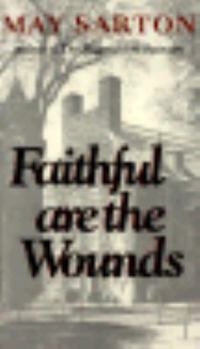Faithful Are the Wounds
Select Format
Select Condition 
Book Overview
Its central character is Edward Cavan, a brilliant English professor, who commits suicide. His death sets off a shock wave among Cavan's friends and changes things for some of them forever. This description may be from another edition of this product.
Format:Paperback
Language:English
ISBN:0393302660
ISBN13:9780393302660
Release Date:January 1985
Publisher:W. W. Norton & Company
Length:282 Pages
Weight:0.40 lbs.
Dimensions:0.7" x 4.1" x 7.0"
Customer Reviews
2 ratings
Still relevant a half-century later
Published by Thriftbooks.com User , 14 years ago
I've been making my way, with pleasure, through May Sarton's repertoire (all obtained at used book stores). After reading the back cover of Faithful--"A powerful dramatization of the plight of the embattled American liberal in the 1950s"--I was doubtful that such a political treatise would be my cup of tea. But good old May Sarton, the book's about passion, and the book's about people and their relationships with one another, and insofar as that's political, she's carried the job off in a highly readable and appealing fashion. There's professors and old ladies to the left, a husband and wife in the middle, someone's sister to the right, but the only ones treated dismissively or with a slight curl of the lip are several peripheral right-wing dads and an s.o.b. of a Senator. Go May Sarton; this book's another winner, no less so for its 54 years since publication!
Civil liberties adherent
Published by Thriftbooks.com User , 19 years ago
Edward Cavan committed suicide. Isabel, Mrs. Henry Ferrier, is Edward's sister. Her viewpoint is the first one described by the author. In his world Edward was famous. He had written a lot of books. He had stood up for every issue and was considered a maverick by some people. Edward was a socialist. He had campaigned for Henry Wallace. Isabel felt his politics were not quite correct. His student, George Hastings, was told by Edward, after he had an outline for his book, to be prepared for a let-down. He would never see his subject again as clearly until the work was completed. George was warned he might experience a creeping crisis of nerve. Edward Cavan called himself a Christian Socialist. In the Cold War period, attending a meeting of the Civil Liberties Union, he learned of the application of a sort of loyalty vetting. His opposition to such a practice was principled. Orlando Fosca seemed like an absent-minded professor to his landlady. Edward Cavan had been like a son to Fosca after his wife died. Now Edward felt personally betrayed at the meeting by one of his friends, Damon Phillips. Edward was told he had a morbid sense of responsibility for what happened in the world. Edward walked in Mt. Auburn cemetery with an old friend, an older single woman whose father had been a dean at Harvard. The friend, Grace, focused on politics. She said that old friends ought to be able to help each other. He found he could no longer communicate with Ivan Goldberg, the most gifted man in his department, someone who had read his manuscripts in the past. Edward told Grace that it seemed that he had fights with everyone at Harvard. Damon Phillips had a strong family-feeling and lived in his father's house. Edward seemed to want to break away from his friends. He could not compromise. He thought that intellectuals should show solidarity. No one could keep Edward from being lonely. After Edward's death Damon was called upon to testify before a Senate Committee. He found that he could not back down, but had to support a citizen's right to exercise the promptings of his conscience. This very good book calls to mind the terrible cloud on academic freedom of the McCarthy era.





